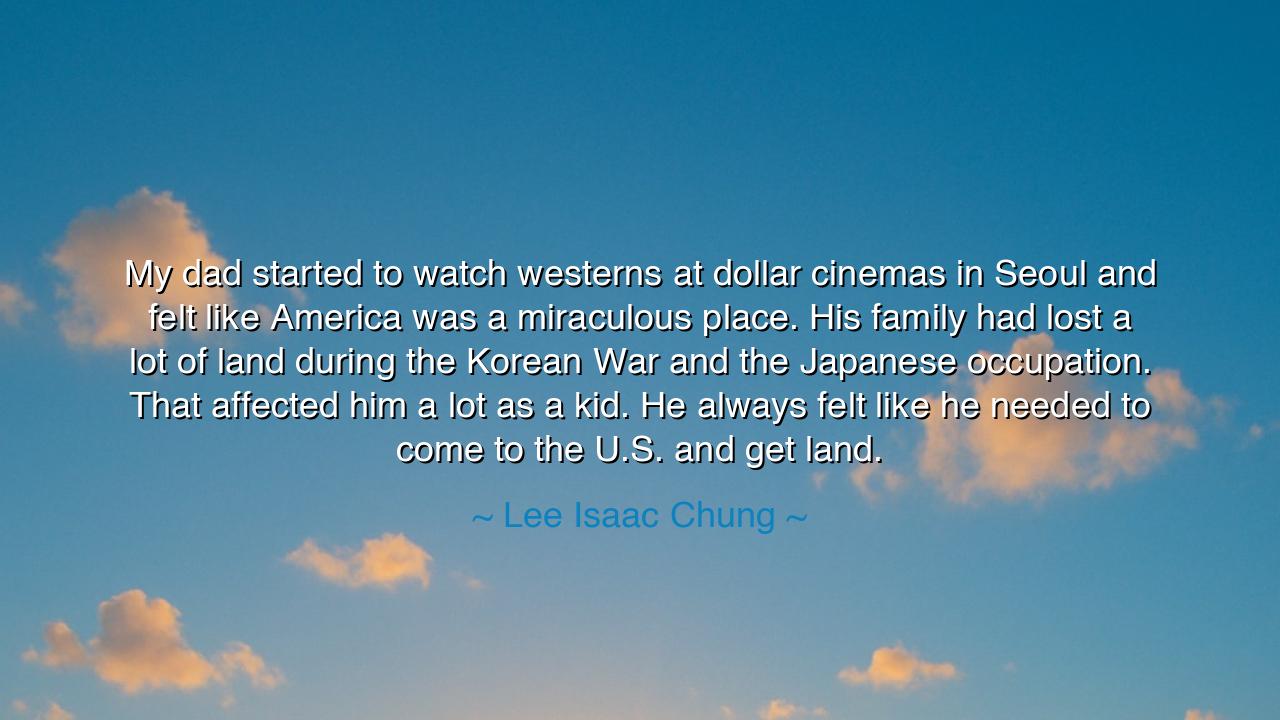
My dad started to watch westerns at dollar cinemas in Seoul and
My dad started to watch westerns at dollar cinemas in Seoul and felt like America was a miraculous place. His family had lost a lot of land during the Korean War and the Japanese occupation. That affected him a lot as a kid. He always felt like he needed to come to the U.S. and get land.






In the quiet remembrance of family and history, Lee Isaac Chung, the visionary filmmaker behind Minari, spoke these words of his father: “My dad started to watch westerns at dollar cinemas in Seoul and felt like America was a miraculous place. His family had lost a lot of land during the Korean War and the Japanese occupation. That affected him a lot as a kid. He always felt like he needed to come to the U.S. and get land.” These words, born of memory and migration, carry within them the echo of generations — of loss, longing, and the unending human desire to rebuild. In this simple recollection of a father’s dream lies the great story of humanity itself: the eternal search for home, for dignity, and for a patch of earth one can call one’s own.
From the soil of Korea, ravaged by war and foreign occupation, rose a man who saw in distant America not merely wealth or opportunity, but restoration. To a child who had watched his family’s land stripped away, the earth itself became sacred — a symbol of life, freedom, and identity. The Western films he watched in Seoul were not just tales of cowboys and open plains; they were visions of an untamed world where a man might reclaim what fate had taken from him. The flickering screen became a window into hope — into a land where loss might be reversed through courage and work. And so, like many before him, he carried that vision across oceans, seeking to transform it from dream to soil, from longing to life.
It is no coincidence that land holds such power over the human spirit. From the earliest dawn of civilization, the earth has been more than property — it has been identity, belonging, and legacy. To plant a seed, to harvest from one’s own ground, is to be rooted in the universe itself. For those who have lost land — through war, conquest, or exile — that loss is not merely economic, but spiritual. It is the loss of place, of memory, of continuity. Thus, the yearning of Chung’s father mirrors that of countless ancestors: the Hebrew exiles dreaming of Jerusalem, the farmers of Ireland driven by famine, the freed slaves of America seeking their own fields to till. In every age, to regain the land is to reclaim the self.
Consider the story of George Washington Carver, born into slavery in a country that denied him ownership of even his own body. Yet through his devotion to the soil, he transformed not only his own life but the lives of millions. He taught poor farmers to renew the land, to draw abundance from dust, to find dignity in labor. Like Chung’s father, he understood that the land is a living covenant — between toil and hope, between man and destiny. Both men, though separated by continents and centuries, shared the same truth: that to cultivate land is to heal the wounds of history.
In Lee Isaac Chung’s reflection, we see the tender inheritance of that dream. His father’s longing for land was not greed, but redemption — the attempt to recover what war and empire had taken. It is the dream of the immigrant, the builder, the survivor: to take the ashes of the past and grow something green. And from that longing was born Minari, a story not only of Korean soil transplanted to America, but of the spiritual roots that survive displacement. The father’s dream, though scarred by hardship, becomes the son’s creation — art grown from memory, love born from struggle.
Yet there is also quiet wisdom in this story: that even as we seek new lands, the true homeland is carried within. The father’s journey across the sea was not merely for earth beneath his feet, but for peace within his heart — the peace of knowing that one’s labor will endure, that one’s family will stand upon solid ground. But the son, the storyteller, discovers that the land he inherited is not only physical — it is the legacy of perseverance, imagination, and faith. Thus, the soil becomes both literal and symbolic: it is the place we till, and the spirit we nurture.
The lesson, then, is both timeless and tender. Honor the land that shaped you, but do not be imprisoned by loss. Seek not only to reclaim what was taken, but to build anew — for the true power of humanity lies not in possession, but in creation. When the storms of life uproot you, plant again; when history takes your inheritance, let hope become your seed. For as Chung’s father believed, and as his son has proven through art, the land we seek is not only of the earth — it is the ground of the soul, where memory, resilience, and love take root.
So remember, my children: even if your homeland is lost, your spirit remains fertile. From ruins can rise renewal; from exile, a new belonging. Carry your ancestors’ dreams with you, as seeds in your pocket, and when you find your soil — wherever it may be — let them bloom. For the story of Lee Isaac Chung’s father is not only one man’s tale; it is the story of all who wander, all who hope, and all who believe that from sorrow can spring creation, and from longing, home.






AAdministratorAdministrator
Welcome, honored guests. Please leave a comment, we will respond soon